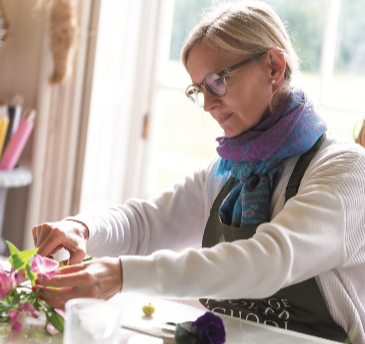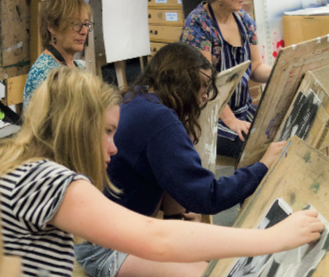Now is the perfect time to head back to school and learn something new. Charlotte Phillips finds that whatever you’d like to do, there’s a course out there for you
January, as we all know, is the month of good intentions. So if you were teetering on the brink of signing up for classes in, say, pottery, cookery or DIY back in September but somehow didn’t get round to it, don’t worry – there are plenty of other people who, like you, are planning a fresh start for 2019, and our area’s fabulous adult education providers are ready and waiting.
People can hesitate because they feel there’s already so much going on in their lives that they just can’t make the time for a hobby. Admittedly, those in full-time jobs may have less leisure time but, according to the Office for National Statistics, they enjoy it far more.
Having a hobby can even enhance your career – some business leaders reckon they increase creativity. Mark Zuckerberg, for example, sets himself non-work-related challenges – like building an AI system to control his home.
Making the most of your leisure time can be life – as well as career – enhancing. According to a report by insurance company LV, half of the retirees it surveyed are using their new-won freedom to spend time on hobbies, with around a fifth taking the opportunity to learn something new.
TV undoubtedly influences which hobbies are in vogue. It’s unlikely to be sheer coincidence that ceramics and cookery classes have all been top favourites with adult learners since shows such as The Great Pottery Throw Down and The Great British Bake Off took off, while the success of Strictly is claimed to be at least partly responsible for a 70 per cent increase in new dancers aged 50 and over.
“Making the most of leisure time can be life changing”
And even if pirouetting, pot throwing or parboiling aren’t your preferred routes to personal growth, you can be almost certain that between them, our area’s adult education providers will have something that’s a perfect fit for not only your 2019 aspirations, but your time and commitment level.
Counselling classes continue to flourish – starting with Hills Road Sixth Form College’s Introduction to Counselling. An unaccredited dip-a-toe-in-the-water course, it’s a brilliant way of seeing if the subject is right for you. Some students go right through to a Level 4 Diploma in Counselling.
“Successful completion means that students are qualified counsellors and can go into practice,” explains Rory Seddon, director of business and finance at Hills Road Sixth Form College.
For many students, however, it’s all about making the most of a new hobby. Any proud present receivers of cameras or oil paints seeking advice on how to get the best out of them will find Hills Road packed with expert tutors who are on hand to help.
Perennial course favourites, such as ceramics, drawing and painting are “likely to be very popular again”, says Rory.
“Photography courses tend to be popular in the spring term, as many students like to get an understanding of the intricacies of their new camera, while others like the frosty, misty and potentially snowy conditions that this time of year provides.”
Madingley Hall
Madingley Hall, home to the University of Cambridge Institute of Continuing Education (ICE), attracts a diverse bunch of students. What unites them is a shared passion for a particular subject and the desire to take it as far as they can in their spare time.
“A typical pathway is for a student on a short course to become so inspired that they progress to an award-bearing programme, leading to a University of Cambridge Undergraduate or Postgraduate Certificate or Diploma – also available on a part-time basis at ICE,” says ICE marketing coordinator Joshua Hatley.
Whether they sign up for a course at ICE in the new year (or in any other season), students will find a mind-expanding range of tempting topics, with over one hundred different short courses alone.
Some seem particularly apt for a new year mindset, such as Wellbeing at work – a day-long course that covers ‘the neuropsychology of resilience and performance’. For those in search of a more practical approach to getting through those germ-filled winter months, there’s another one-day course, Staying alive; the immune system in health and disease, running in January.
Madingley Hall itself is the perfect place to foster a post-Christmas sense of renewal. Creative types signing up for its one-day Creative Writing Retreats (one among several writing-related courses) can’t help but find the historic house and eight delightful acres an ideal backdrop for learning, reflection and taking stock.
Students looking to study remotely are well-catered for, too. ICE’s online courses, ranging from an introduction to travel writing to executive coaching, are proving popular, according to Joshua. “They’re very in demand and a great way to ‘taste’ a Cambridge course from a distance and get immersed in the subject of your choice.”
That flexibility brings ICE courses to a wide range of students. Add the support of a friendly community and many students who start with a taster course can end up taking their interest to the highest levels.
 Cambridge Cookery
Cambridge Cookery
Cambridge Cookery’s online images exude colour and a zest for life, and the role good food plays in it. It’s a reflection of founder Tine Roche’s philosophy. “Creating delicious food is life-enhancing,” she says. It’s the reason her courses include plenty of time not just to create the food, but enjoy sitting down to eat and talk with the other students – and it’s a philosophy that holds just as true in the new year. “In January, the last thing you need is a punishing diet,” she says.
All the tutors at Cambridge Cookery, now in its tenth year, have been through classic training courses (many are Leiths Cookery School alumni) and courses focus on equipping students with similarly traditional skills, covering everything from easy entertaining to curries of the world, a very popular option. “Whether making the best cakes or learning how to fillet fish, it’s very much based on classic, solid technique. There’s no fuss or fads, just good practical cooking,” explains Tine.
In addition to what the college refers to as ‘the big one’ – an eight-week course running on consecutive Tuesday evenings – there are half-day sessions that end with a lovely lunch or dinner, eaten communally.
“People often don’t want to leave. They say, ‘This is nicer than most of the dinner parties I’ve been to in the past few years’. They’ve met new people, sat and talked,” says Tine. Attendees range from young professionals to people with careers and families who “still feel they need to take time out to engage with food”. Some of those signing up are cooking for themselves for the first time following divorce or bereavement.
While Cambridge Cookery courses don’t lead to professional qualifications, some of those who attend are inspired to go on to further training. They’ve had men who’ve completed a course, then taken over all the cooking at home and siblings who wanted to learn how to transform the café at the garden centre they run.
Whatever students’ motivation, Tine and her colleagues will ensure that the course isn’t just useful but hugely enjoyable. “It’s about engaging with food and eating with others. The whole experience of coming here is incredibly joyful,” says Tine.
The Cambridge Flower School 
People signing up for courses at The Cambridge Flower School may have loved cut flowers all their lives, but don’t have a clue about how to arrange them.
“They want to learn how to do something with them rather than just pop them in a vase and hope for the best,” says tutor, Gussie Sneddon.
Others may be approaching retirement or stuck in a career that they no longer find fulfilling. “They fancy a change and we’re the light at the end of the tunnel. If they have to go back to work after coming here, they’ve got a kind of get-out clause,” says Gussie.
Unsurprisingly, Cambridge Flower School’s five-day intensive career change course that runs almost every month during 2019 is extremely popular – even though it’s highly demanding.
“Don’t get carried away by the romance,” warns Gussie – who says that people have as a rose-tinted view of floristry (pun intended). “I wouldn’t say that the main proportion of our work is playing around with flowers. It’s cold hands and cold feet, but you create something that’s amazing, clients adore it and that’s unbelievably satisfying.”
In addition to the career change course, Cambridge Flower School offers courses in the evenings and during the day. Some take half days, others run over seven weeks. Attendees learn everything from the basics, such as changing the water regularly, to planning the colour palette. A basic tip is to choose one colour and use lots of different shades within that colour spectrum.
“Bright yellow, pale yellow, lemon white, cream and green will look lovely,” says Gussie.
The school gets thousands of students through its doors every year, including a substantial number who return time and time again, some working their way through every course on offer. That’s down in part to the range of skills they learn, but also because of the convivial atmosphere.
“You can chat to the people around you and have a piece of cake,” explains Gussie. “As much as anything, it’s coming and chatting to like-minded people and meeting new ones.” 
Cambridge Academic Partnership
Adult Learn and Train courses at Cambridge Academic Partnership run throughout the year. Some are training-focused, others linked more to leisure. Running at three venues across the city centre, they’re designed to offer mental stimulation, physical wellbeing, a career boost – or a mixture of all three.
New courses this spring range from ballroom dancing to fish and seafood cookery, forensic science to make-up skills, and from maths function skills to beginner’s patchwork and quilting. On a very different note, the importance of addressing mental health issues is reflected in a course on coping strategies.
One of Cambridge Academic Partnership’s biggest areas of strength is its English and maths courses, which have proved highly successful and are increasingly popular. Students can sign up for everything from functional skills through to GCSEs, with a new maths course running from January at Coleridge Community College. Feedback from learners praises the inspirational teaching that encourages them to keep going and gain the confidence to learn new skills. ‘I love it’ seems to be the most frequent remark.
All courses can be booked online. They take place during the day and evening throughout the week or on Saturdays and at weekends and span a mind-boggling range, so they’re compatible with today’s busy lifestyles and commitments, says Joanne King, Adult Learn and Train manager. “Learners come to our courses not only for the tutor’s expertise, but also to improve their health, build better relationships, gain independence or confidence and progress both in life and work.”
Hills Road Sixth form College 
Last term, 1,250 adult learners signed up for courses at Hills Road. This spring, there are 126 on offer, spanning Arabic to yoga, and they’re likely to prove just as popular.
The college’s 15 language courses attract the biggest numbers of all, with 600 students last term. From this spring, Persian and Catalan have also been added, bringing the total number of languages on offer to 17 – the broadest range offered by any provider in the Cambridgeshire area, according to the college.
Enrolments open a month or so before the start of the new term – though if there’s still room, it may be possible to sign up just after the term has started.
For long courses (of 12 weeks or longer) it’s possible to pay in two instalments (and employers can also pay for courses direct).
Some of those considering adult education this year will be among the 15 per cent of Brits whose new New Year’s resolutions includes rethinking their careers.

